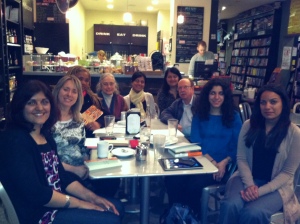I was reading the New Yorker and found an article that resonated with me, about the value of boredom vs. distraction (Only Disconnect by Eugeny Morozov).
It was an interesting discussion of the work of different scholars from the early 20th century to the modern-day about the perils of distraction in urban life; a summary of Dave Egger’s latest fiction, The Circle, which is about a cult-like technology giant that erodes privacy and a short review of three nonfiction books that discuss the impact of digital technology on the issues of attention and distraction. (The Present Shock: When Everything Happens Now, by Douglas Rushkoff; The Distraction Addiction, by Alex Soonjug-Kim Pang and Ambient Commons: Attention in the Age of Embodied Information, by Malcolm McCullough.)
Morozov’s main point is that creating the kind of society we want to live in is a political act, and compares it to the anti-noise lobby of the early twentieth century. If we do not want to be bombarded with smart technology at every step, we should advocate for ‘quiet’ spaces, in our homes and in our towns. He argues that we should not treat boredom and distraction as being at odds with one another, they can be reconciled by the considered and appropriate designation of space for one or the other. He discriminates between healthy boredom and “mediated” boredom, arguing that connectivity and digital distractions do not actually resolve boredom; we have simply lost the ability to recognize we are still bored when we are being bombarded with visuals and audio clips. He quotes Siegfried Kracauer, who championed “radical boredom” for individuals to feel wholly human and present. Kracauer’s essay (published in Zeitung in the 1920’s) extols the virtue of certain activities such as dance and travel to get us closer to “authentic rapture within the inauthentic domain.”
I did not agree with everything in Morozov’s essay; he’s right about “mediated boredom”, but he is dismissive about the role neuroscience plays in modern distraction– I think it is important to note the physiological process going on when digital links and page tabs light up the ephemeral pleasure-reward circuit of our brains. Surely that helps to explain why we willingly stay in the lab-rat mazes of cyberspace for so long and so often (checking our smart phones over 150 times a day on average). Full disclosure: I visited Facebook three times already today.
Morozov suggests that diverse experiences might help us break the hold that connectivity has on us, but he does not go beyond Kracauer’s suggestion of travel and dance. I would like that thought developed further. Why those activities and why not others? Writing? Painting? Gardening? What is the solution to hyper connectivity in a world where we can take our smart phones everywhere we go and check our computers to learn how to go about many of our favorite hobbies? If you think I’m exaggerating, you should have been there when the college guide laughed at me, when I toured a university library recently and asked where the books were. Should we pursue body-centered and multi-sensory experiences to resist the pull of the digital world, or is the cure simply any activity that pushes away the demands of other drains on our attention and allows us to think? Morozov himself locks up his phone in a safe for a certain time every day.
I do like Morozov’s idea that we must redetermine our relationship to time, as well as to space and cognition, to avoid the tyranny of the constant “now”. Unlike the Zen philosophy of being in the moment, our slavish devotion to “breaking news” and “latest trends” and “real-time” actually disconnect us from history, from a perspective of our place in relationship to the past.
I think these questions are worth considering, since we are hurtling towards a fully-digitized life experience at break-neck speed; we are already archivers of our own experience for the consumption of others in our social networking sites. I am not a Luddite, nor elitist, but I find it disconcerting that we don’t often have time to stop and think, particularly as regards the role digital technology has in shaping our modern life and whether or not we could or should do things differently.
Only a few thinkers are charting the way for us, and unfortunately they do not make the wide ripples that a mainstream sociologist, like Malcolm Gladwell might. Jaron Lanier‘s You are not a Gadget is remarkable in its breakdown of the digital revolution on middle-class economics and how we all, as consumers whose lives are being affected by digital technology, must advocate for the society we really want, before it is determined for us. I have not read Who Owns the Future, but that is the next book on my reading list.
Socrates said that “the unexamined life is not worth living.” I would not go that far, but I would certainly recommend that we examine this life and think about how we really want to live.





